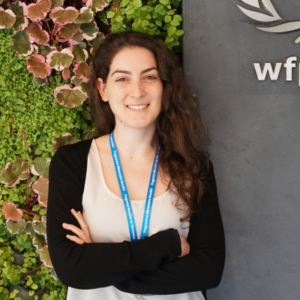Elisa Omodei is the Lead Data Scientist of the Hunger Monitoring Unit at the UN World Food Programme’s Research, Assessment and Monitoring division. She also serves as Vice-President Secretary of the Complex Systems Society. She holds a BSc and a MSc in Physics from the University of Padua and Bologna, respectively, and a PhD in Applied Mathematics for the Social Sciences from the École Normale Supérieure of Paris. After her PhD, she spent two years as a postdoctoral researcher at the Rovira and Virgili University in Tarragona, Spain. She then joined the United Nations in 2017, first at UNICEF’s Office of Innovation in New York and now at the World Food Programme in Rome. Elisa is passionate about technological innovation for social good, and in her work she explores how to apply complexity science, data science and AI for development and humanitarian action.


